Join us in prayer each day this Season of Creation.
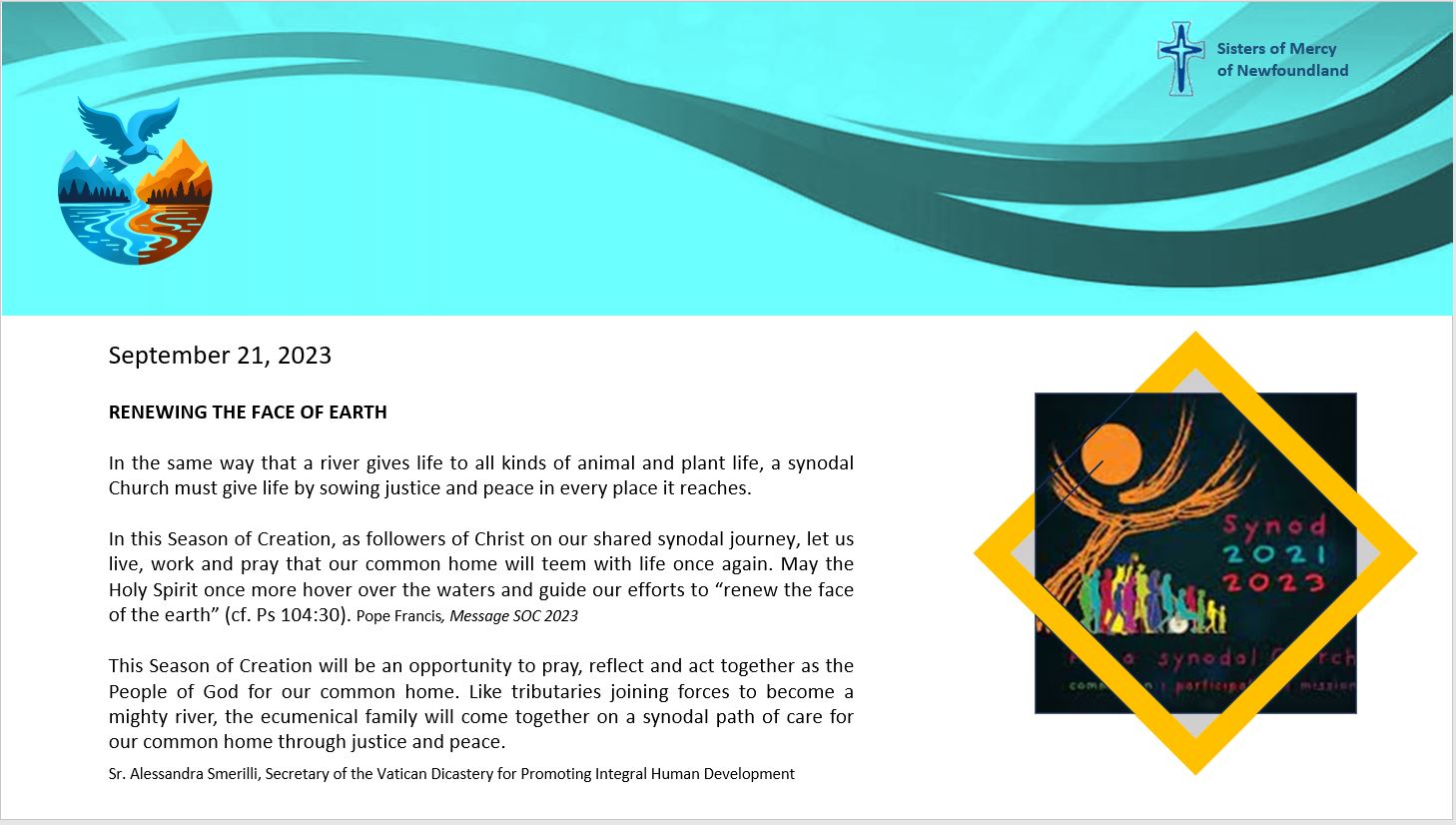
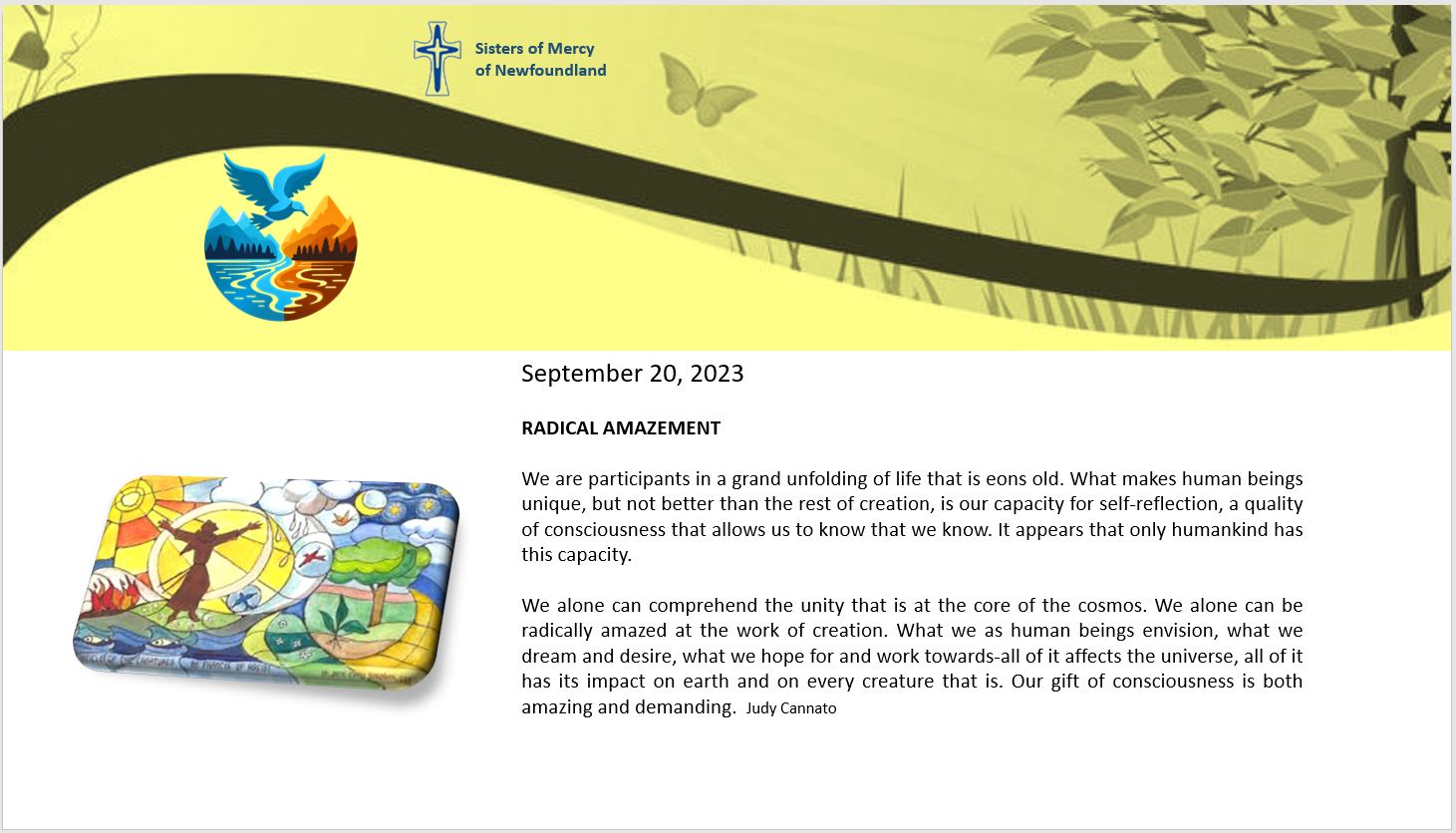
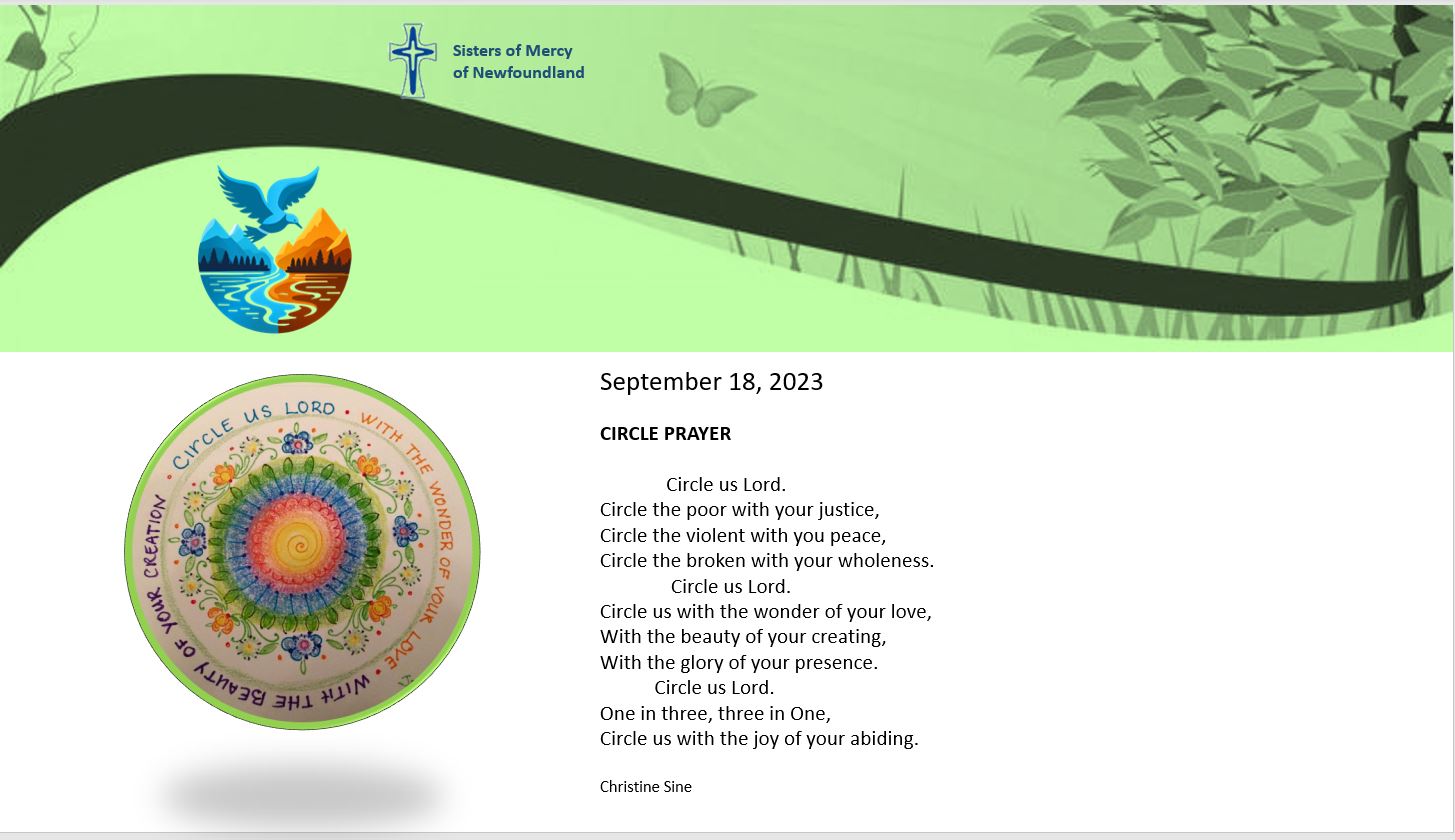
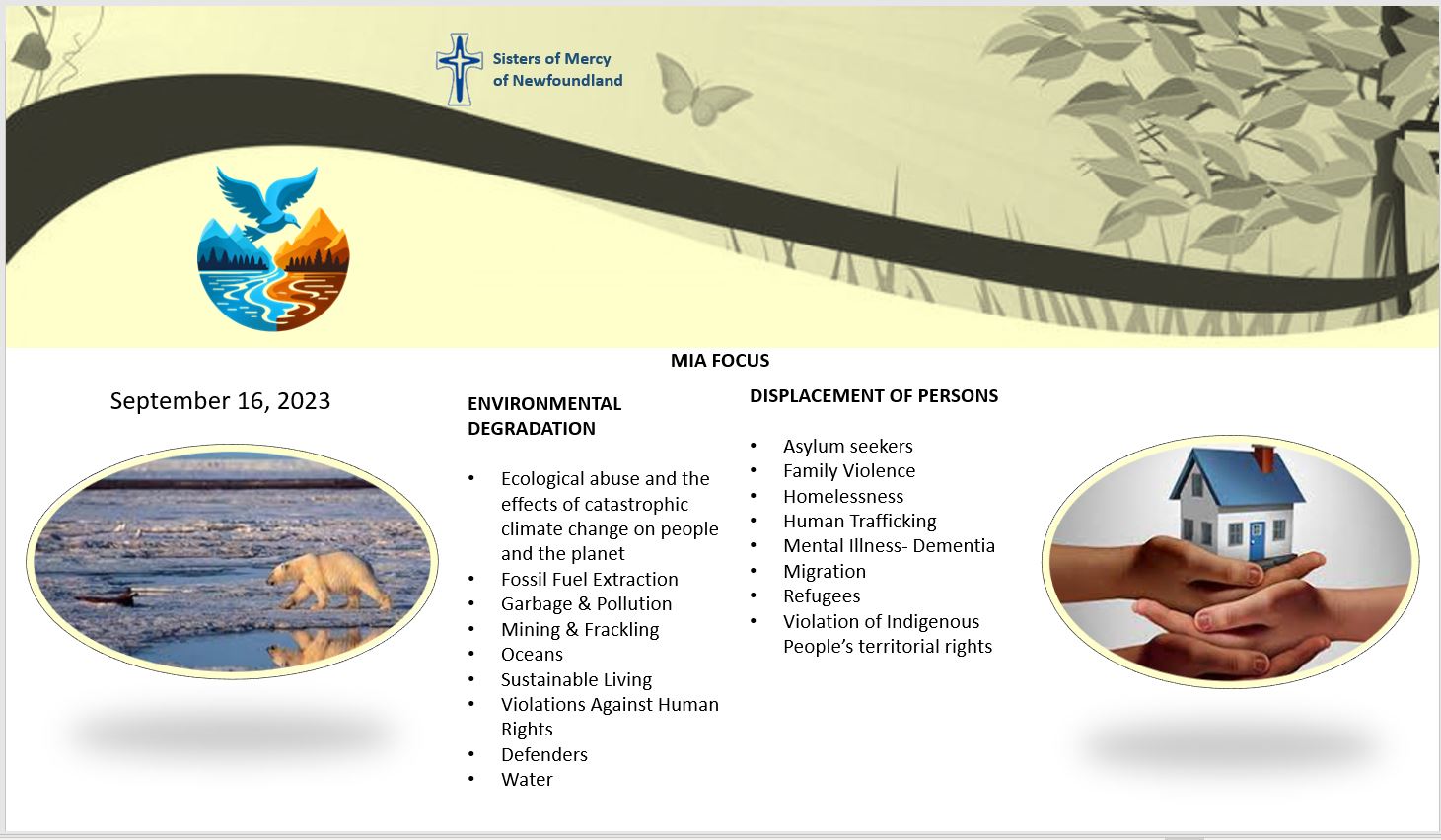
Pope Francis will release a follow-up document on the environment on Oct. 4, providing an update to his 2015 encyclical
“Laudato Si’, On Care for Our Common Home“, a landmark papal letter that offered a rallying cry for global action in the fight against climate change and that was timed to be released ahead of the groundbreaking UN climate change conference in Paris, COP21, focused on reducing carbon emissions.
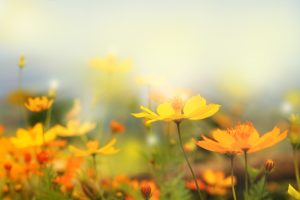 Francis said the new document aims to help “put an end to the senseless war against our common home” and comes after a summer of record-breaking rising temperatures, wildfires and storms. The Vatican Press says it will address “the most recent extreme weather events and catastrophes affecting people across five continents.”
Francis said the new document aims to help “put an end to the senseless war against our common home” and comes after a summer of record-breaking rising temperatures, wildfires and storms. The Vatican Press says it will address “the most recent extreme weather events and catastrophes affecting people across five continents.”
The October. 4 release date of the new exhortation is the Feast Day of the pope’s namesake, St. Francis of Assisi, the 12th century saint known for his concern for the poor and the environment. It is also the date of the final day of what is known as the “Season of Creation,” a month-long ecumenical initiative aimed at inspiring greater prayer and environmental action among Christians. It will be a lead-up to the next global climate summit (COP 28), which will take place in November in Dubai.
El papa Francisco publicará el 4 de octubre un documento de seguimiento sobre el medio ambiente que actualiza su encíclica de 2015 “Laudato Si’, sobre el cuidado de la casa común”, una carta papal histórica que ofreció un grito de guerra para la acción global en la lucha contra el cambio climático y que se publicó antes de la innovadora conferencia de la ONU sobre el cambio climático en París, la COP21, centrada en la reducción de las emisiones de carbono.
Francisco dijo que el nuevo documento tiene como objetivo ayudar a “poner fin a la guerra sin sentido contra nuestra casa común” y llega después de un verano de temperaturas récord, incendios forestales y tormentas. La prensa vaticana dice que abordará “los más recientes fenómenos meteorológicos extremos y las catástrofes que afectan a las personas en los cinco continentes.”
La fecha de publicación de la nueva exhortación es el 4 de octubre. La fecha de publicación de la nueva exhortación, el 4 de octubre, es el día de la fiesta del homónimo del Papa, San Francisco de Asís, santo del siglo XII conocido por su preocupación por los pobres y el medio ambiente. También es la fecha del último día de lo que se conoce como el “Tiempo de la Creación”, una iniciativa ecuménica de un mes de duración destinada a inspirar una mayor oración y acción medioambiental entre los cristianos. Será la antesala de la próxima cumbre mundial sobre el clima (COP 28), que se celebrará en noviembre en Dubai.
Únete a nosotros en oración cada día de este Tiempo de la Creación.
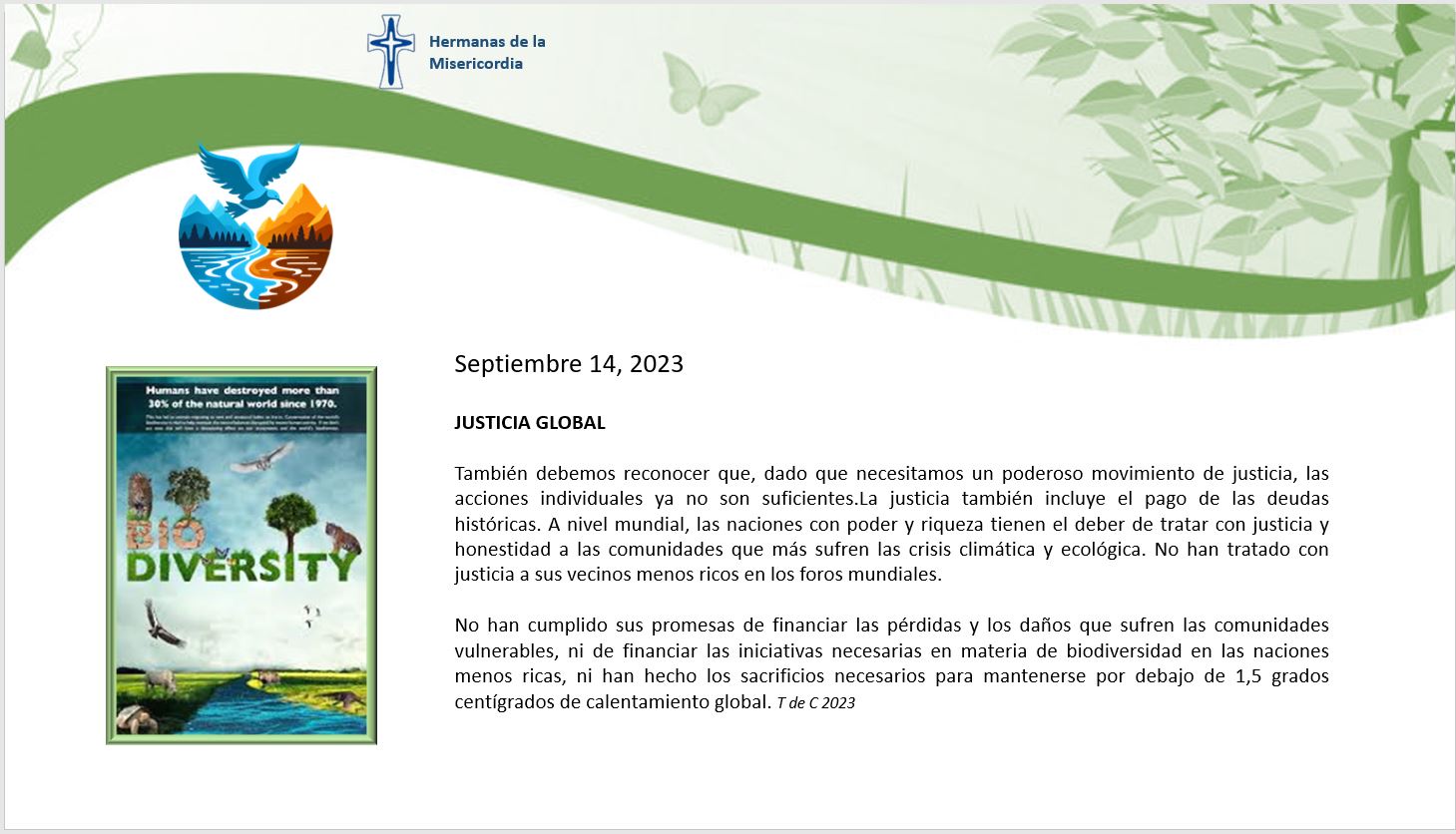
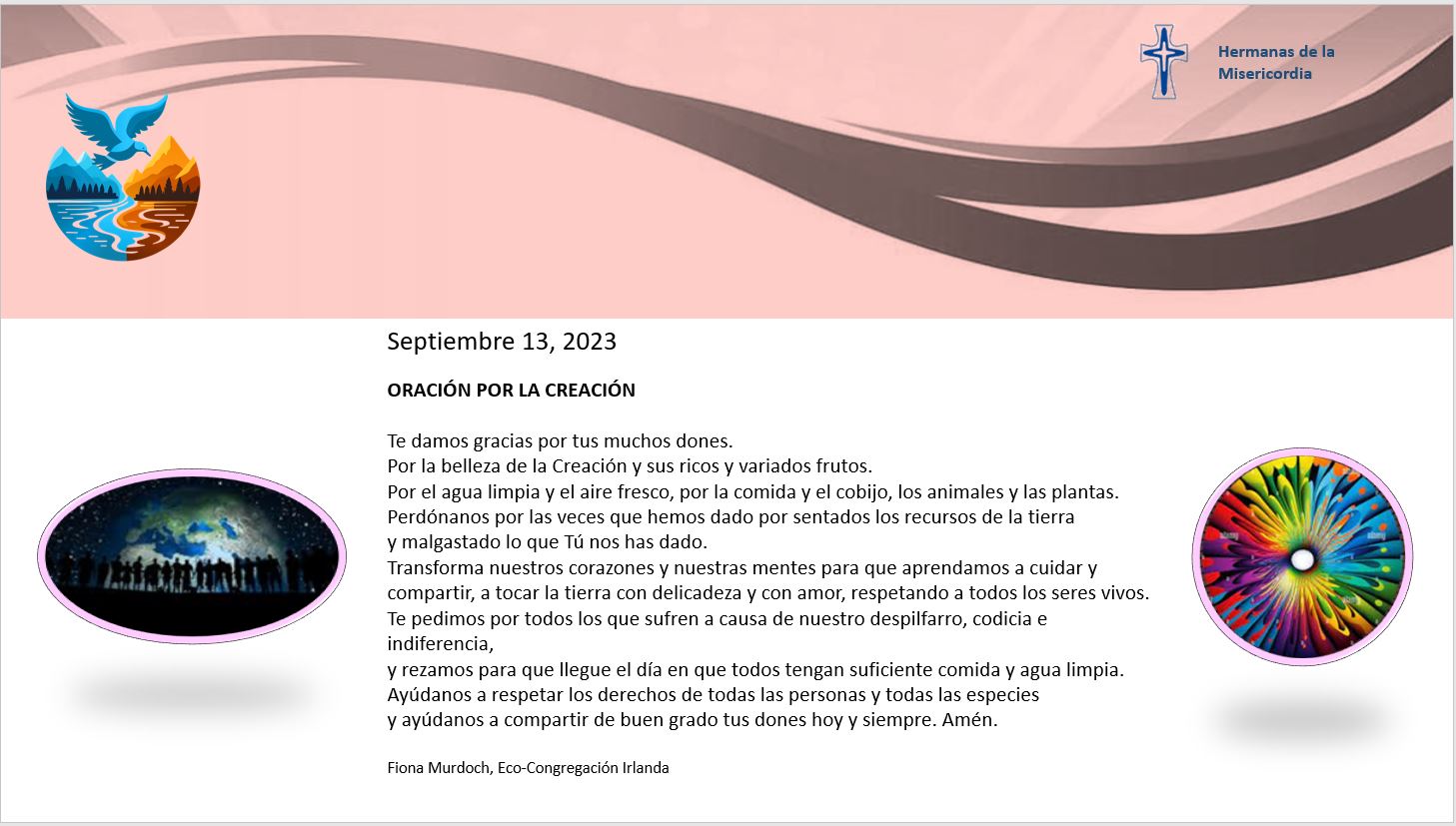
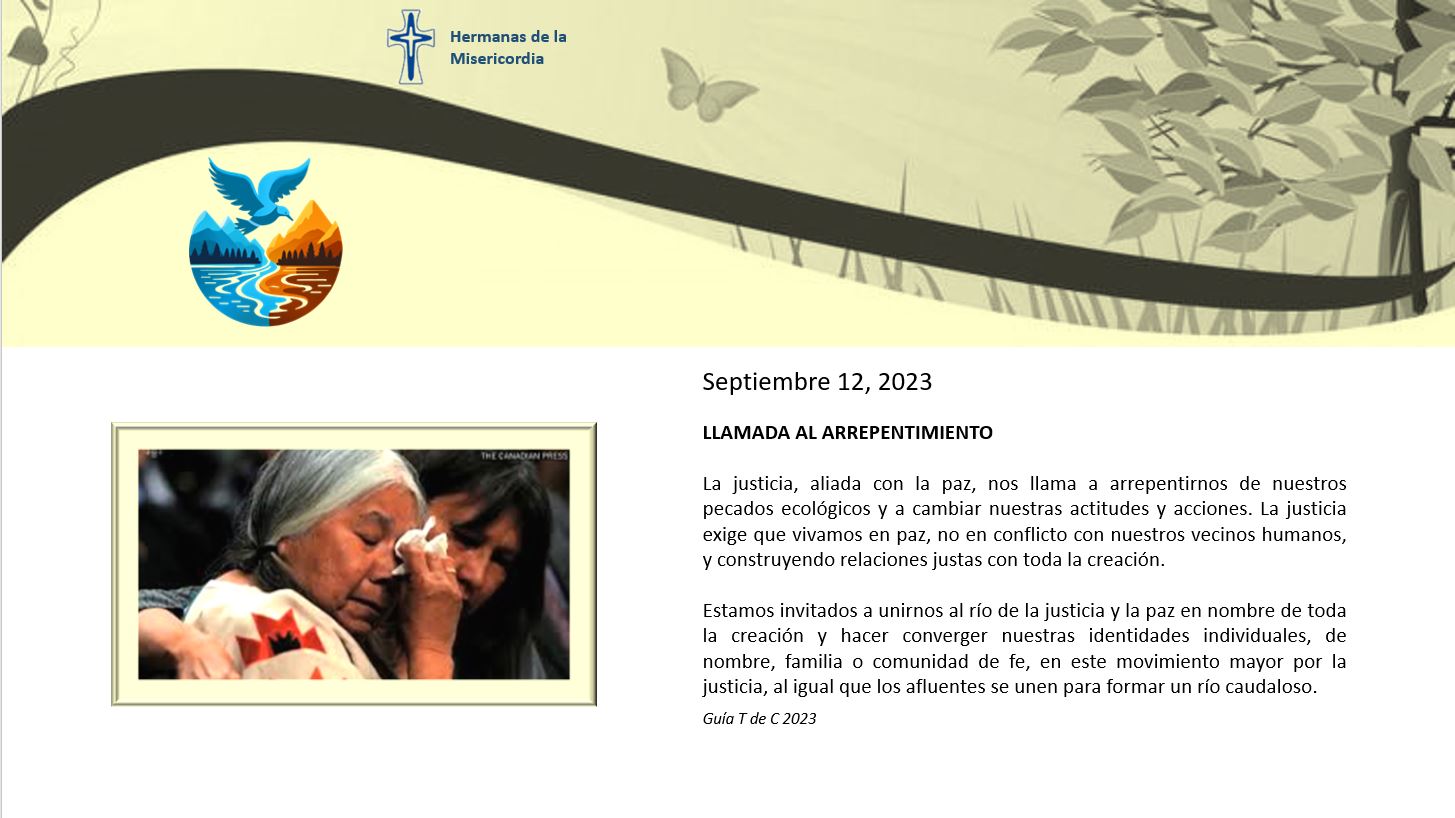
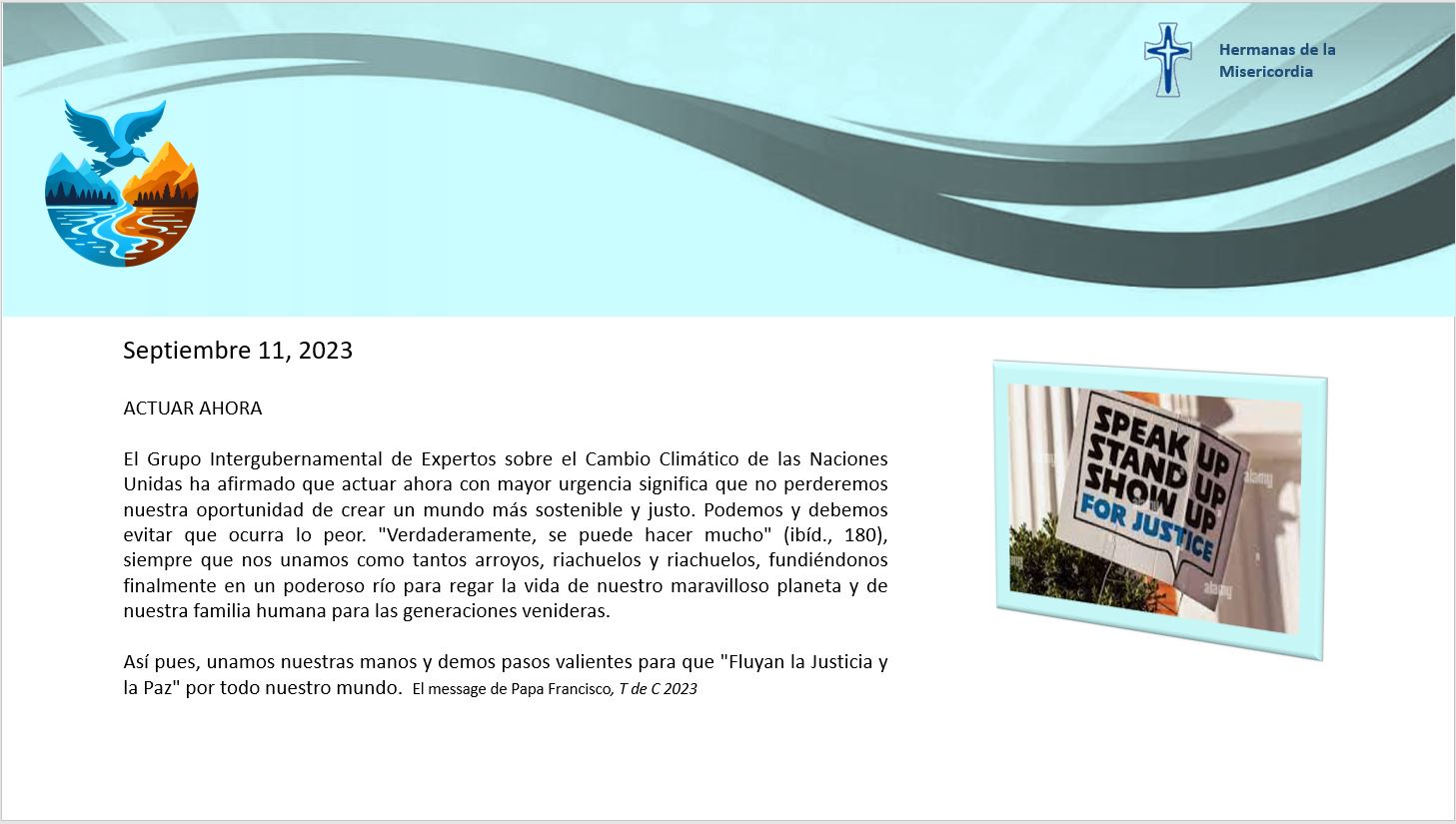
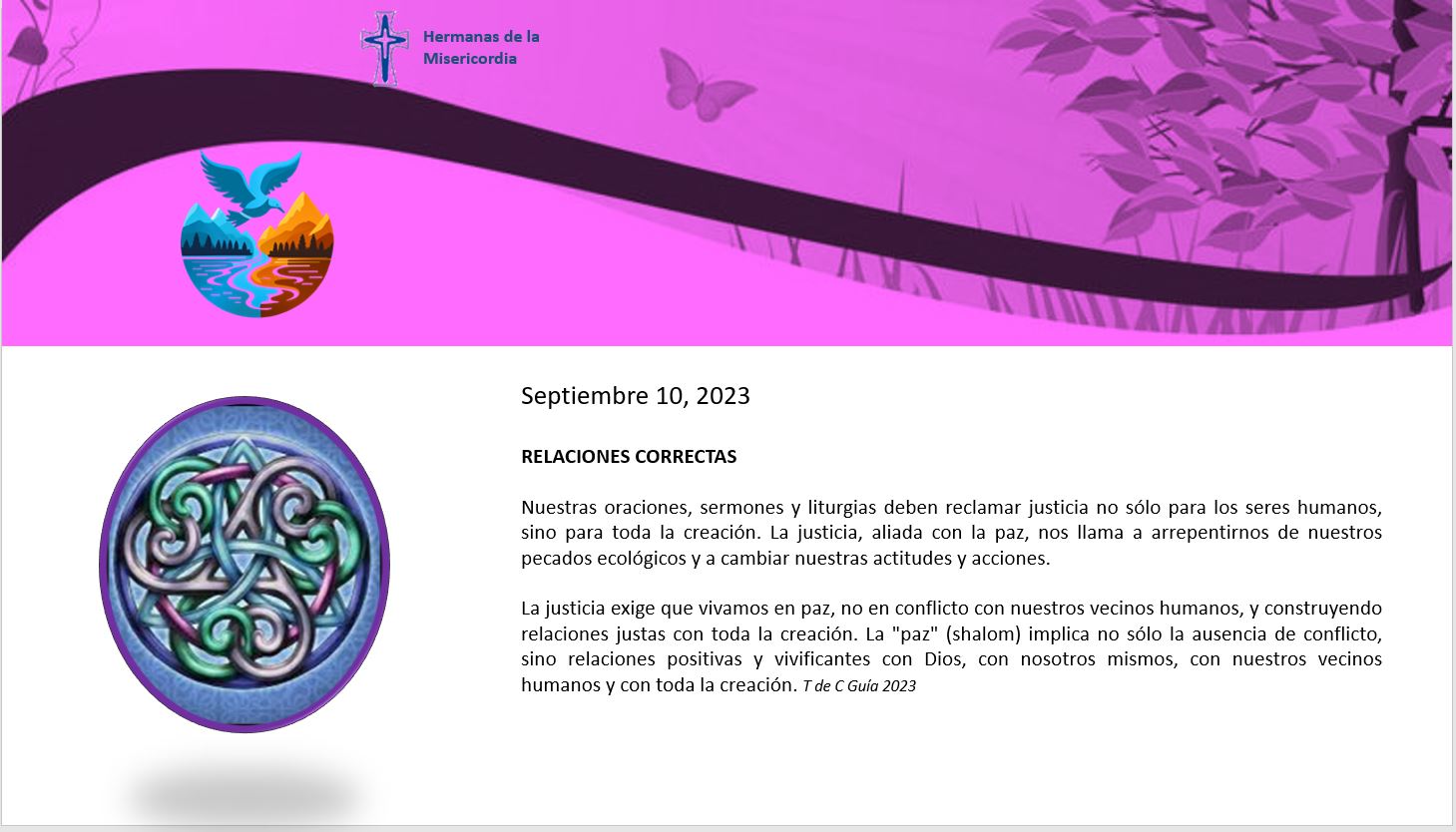
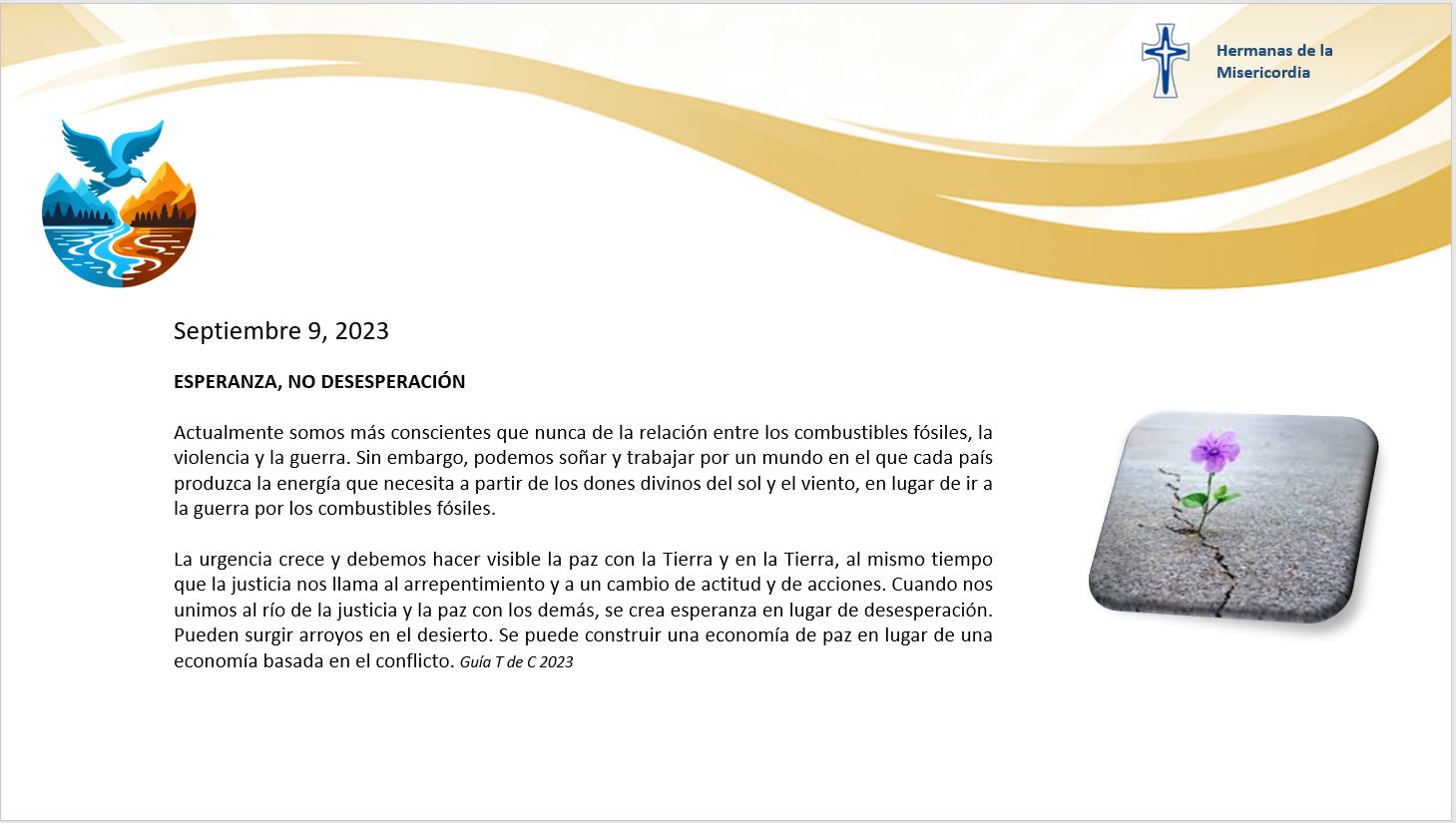
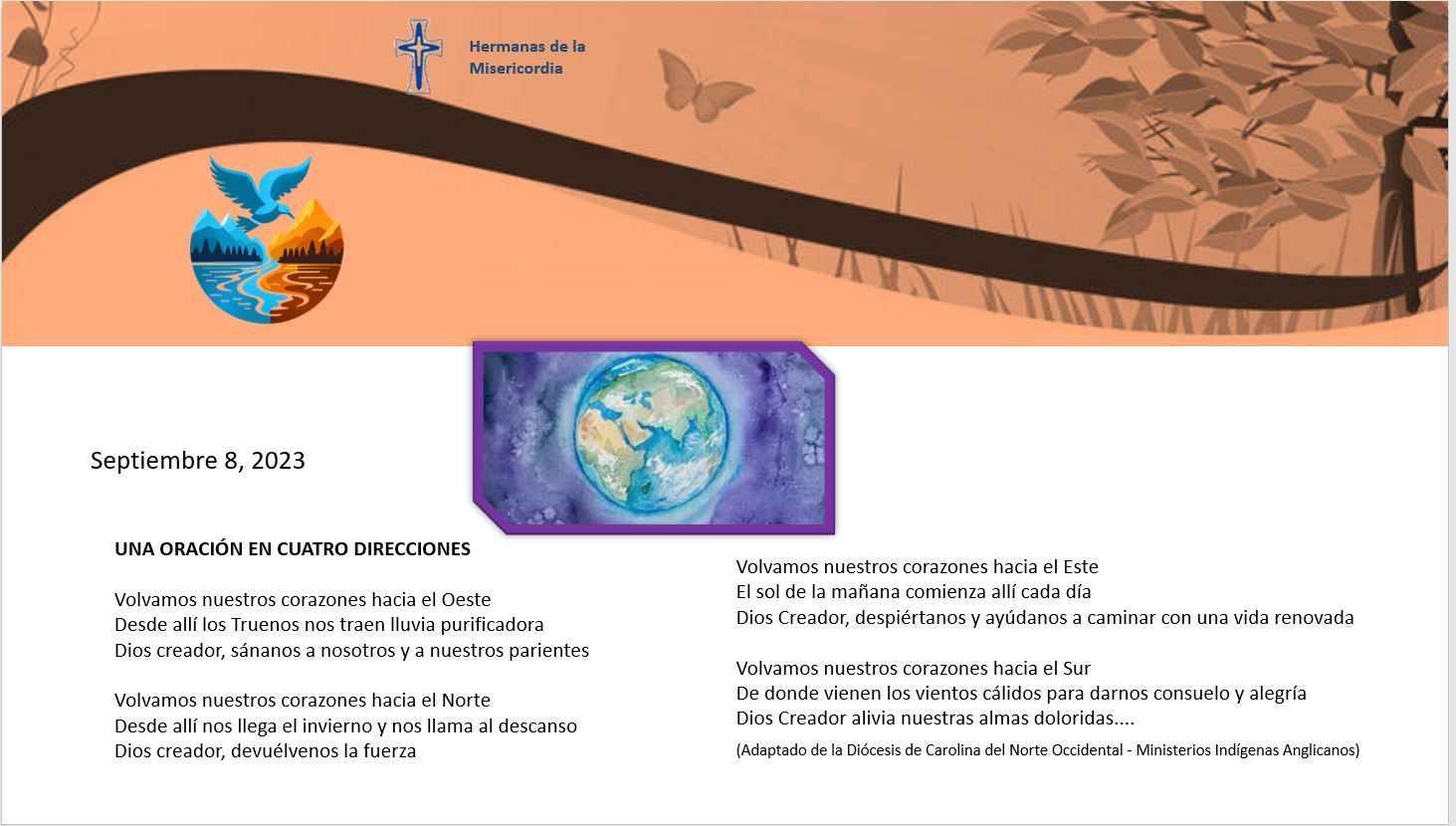
Únete a nosotros en oración cada día de este Tiempo de la Creación.
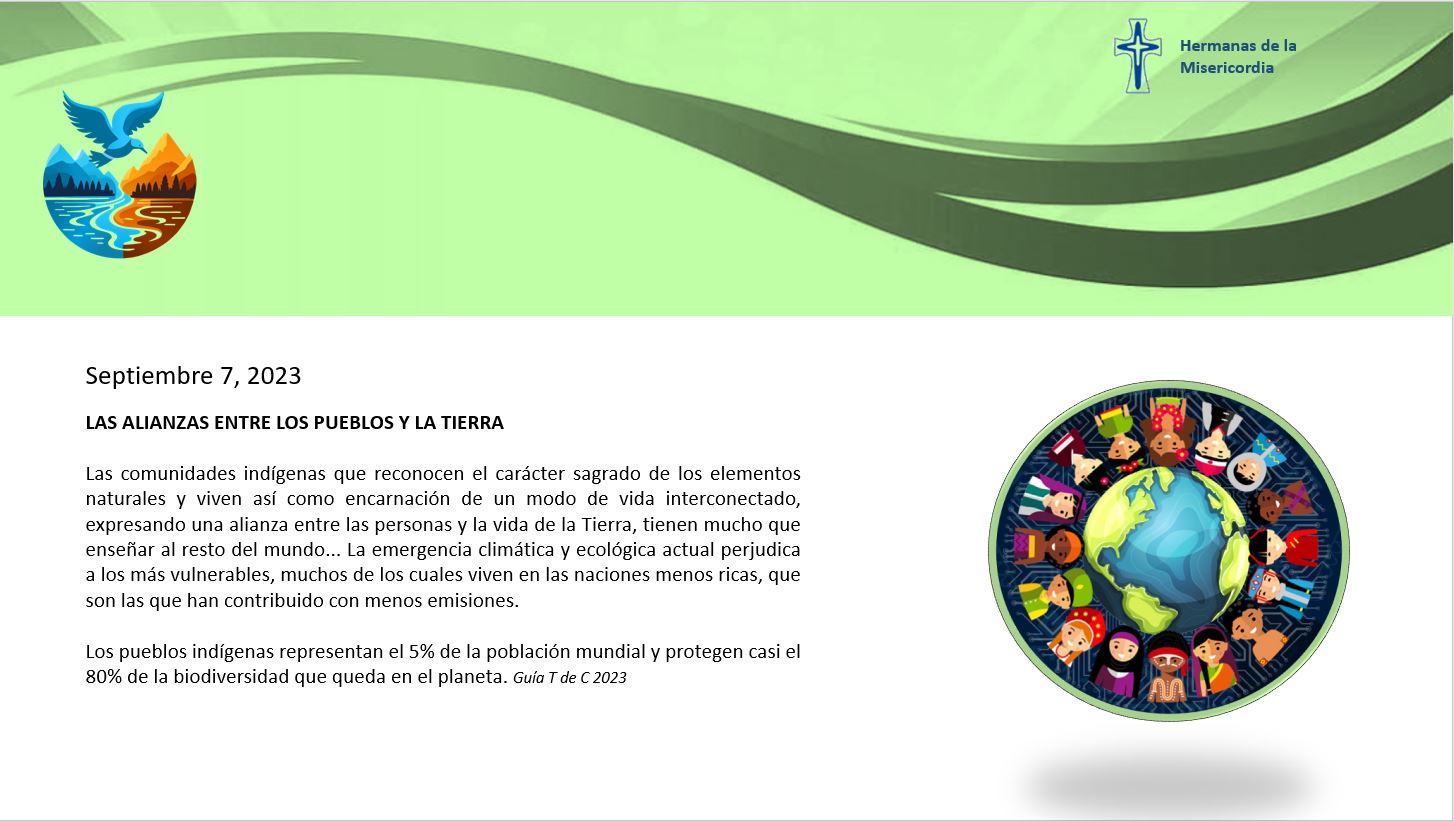
____________________________________________________________________________________________________________________________
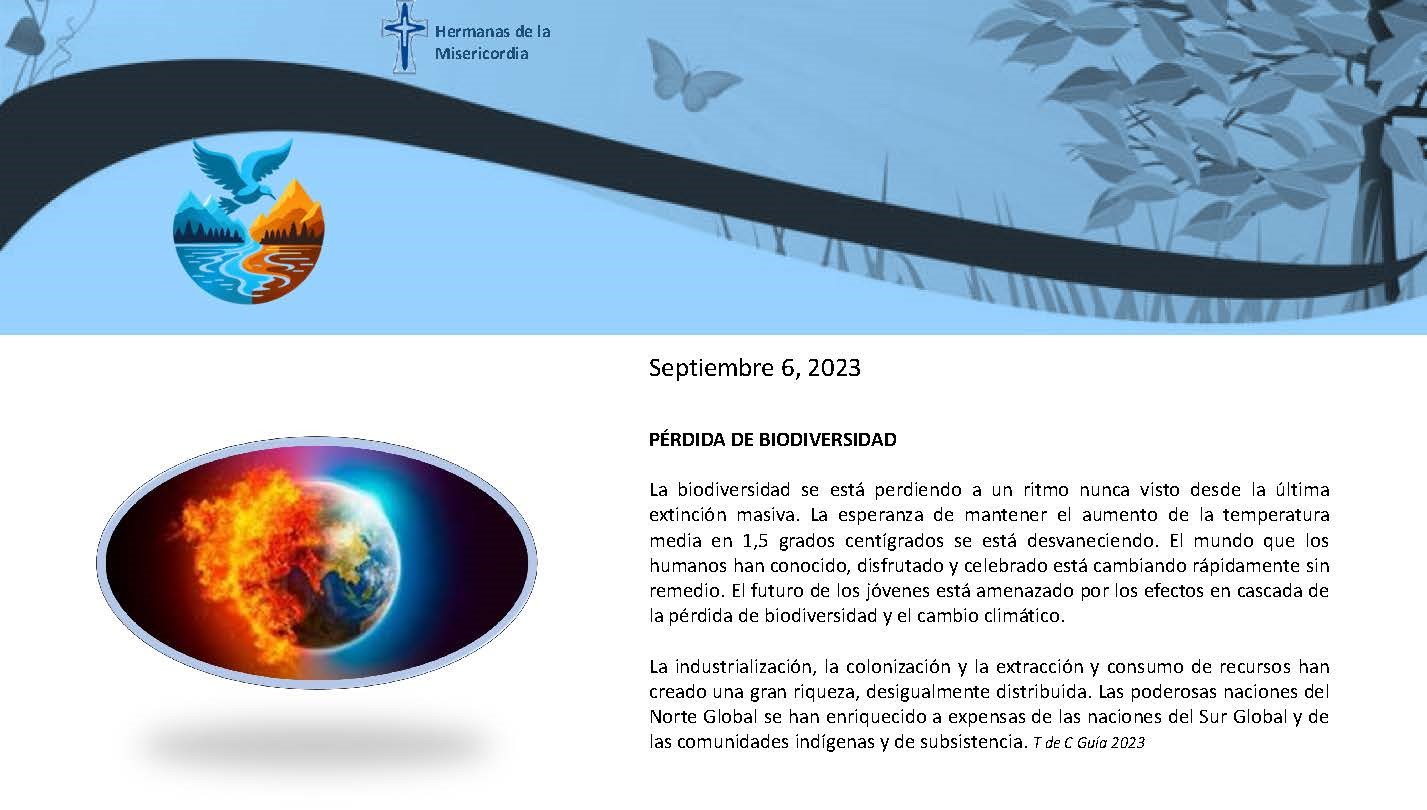
__________________________________________________________________________________________________________________________
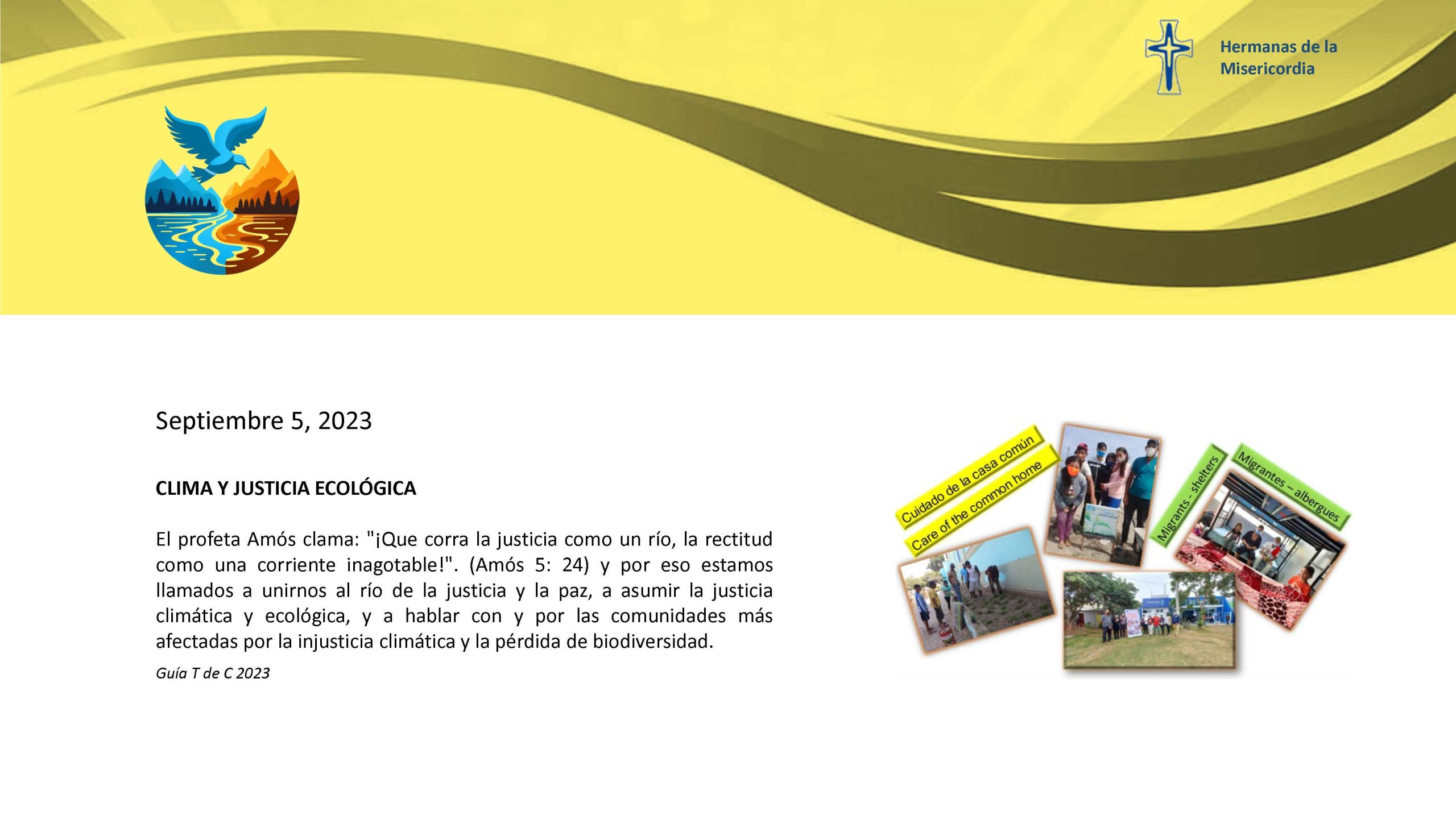
________________________________________________________________________________________________________________________________
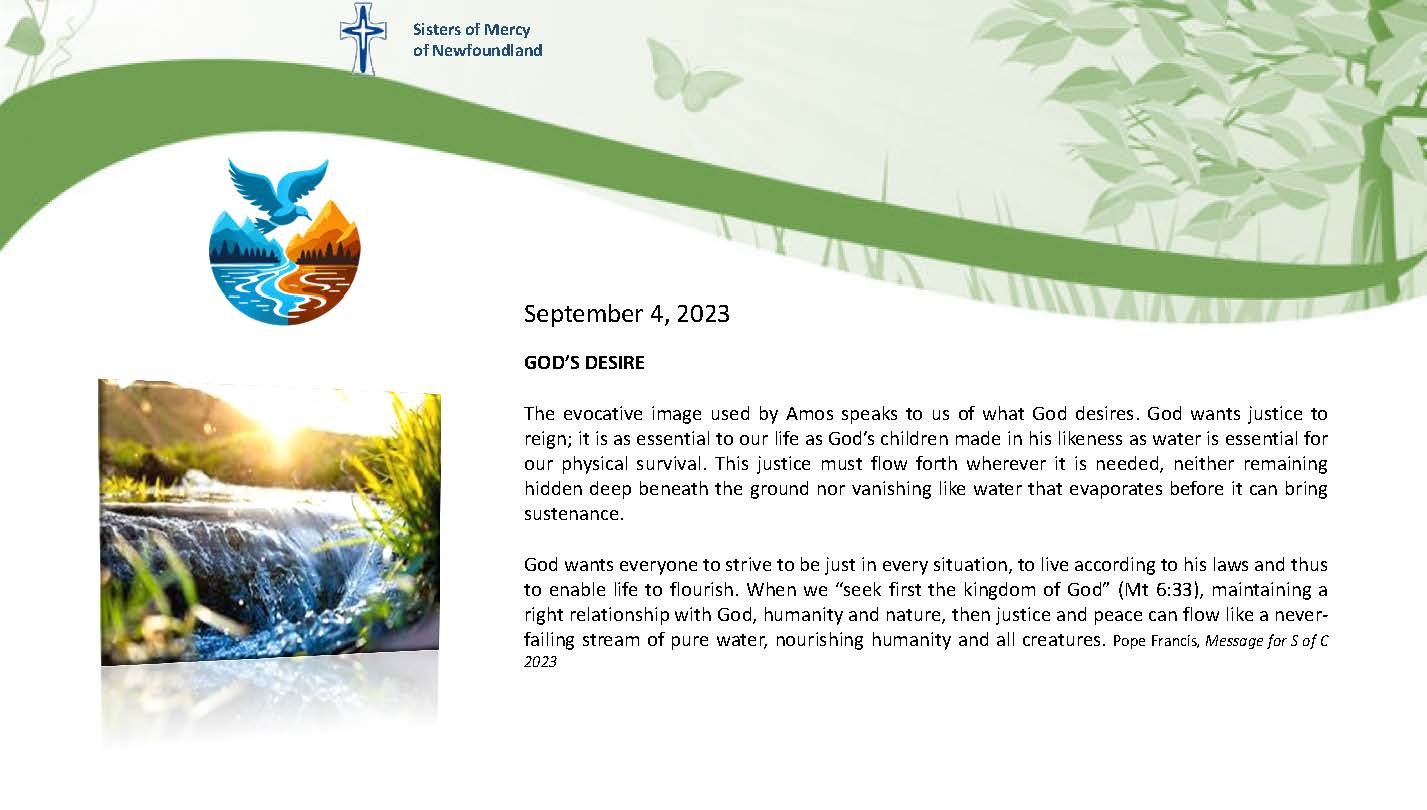
__________________________________________________________________________________________________________________________
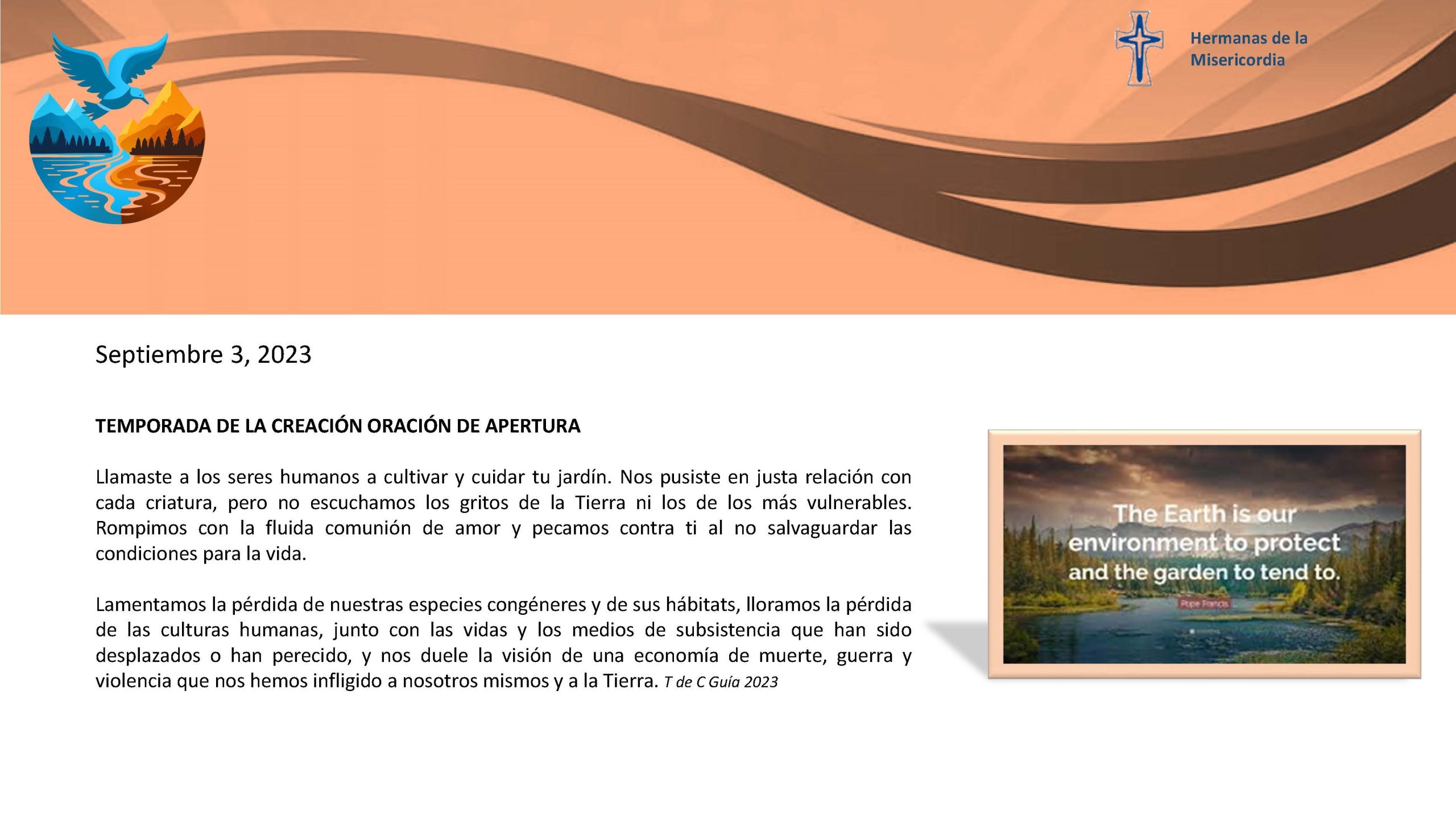
________________________________________________________________________________________________________________________________
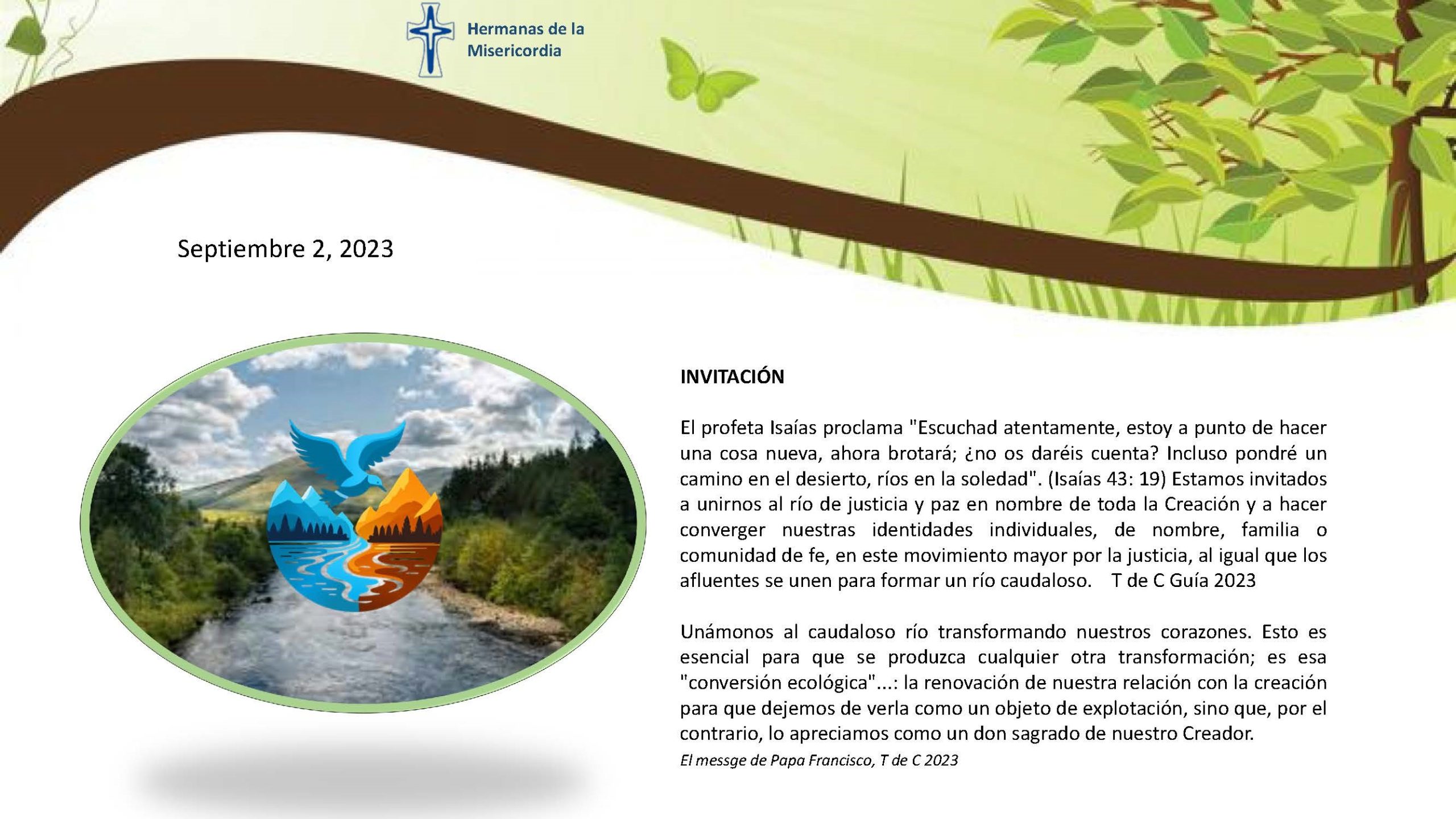
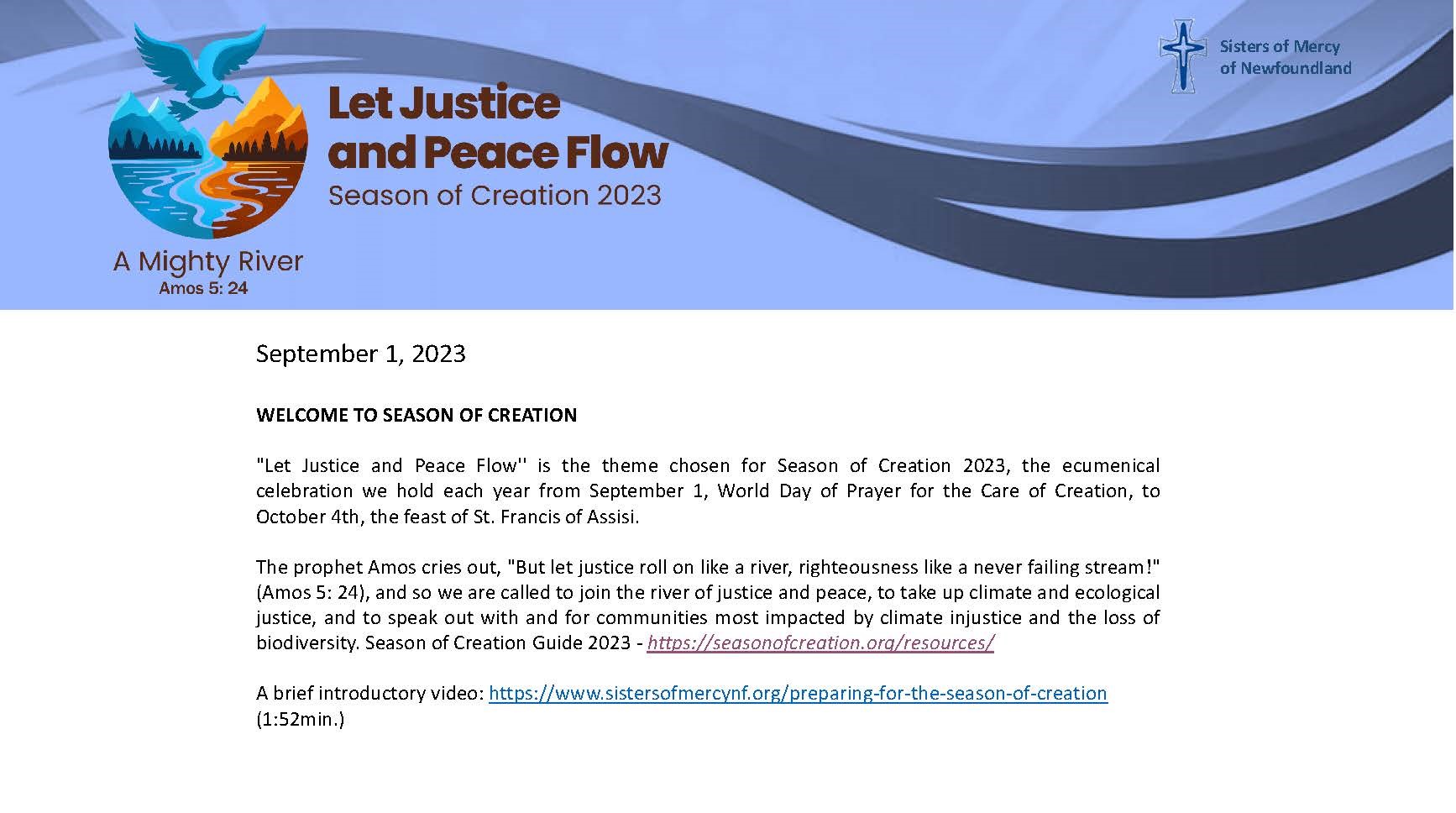
…………………………………………………………………………………………………………………………………….
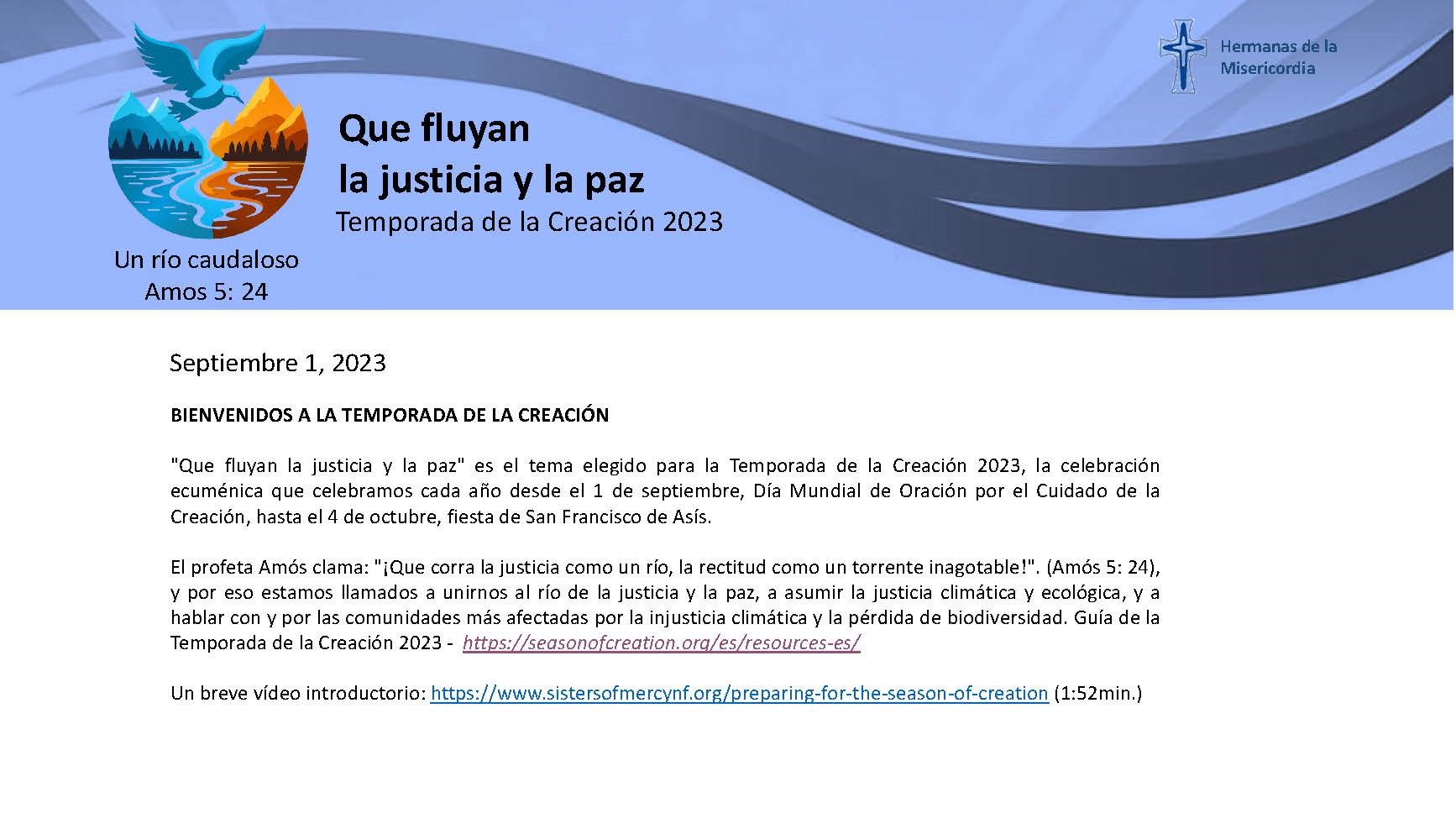
Join us in prayer each day this Season of Creation.
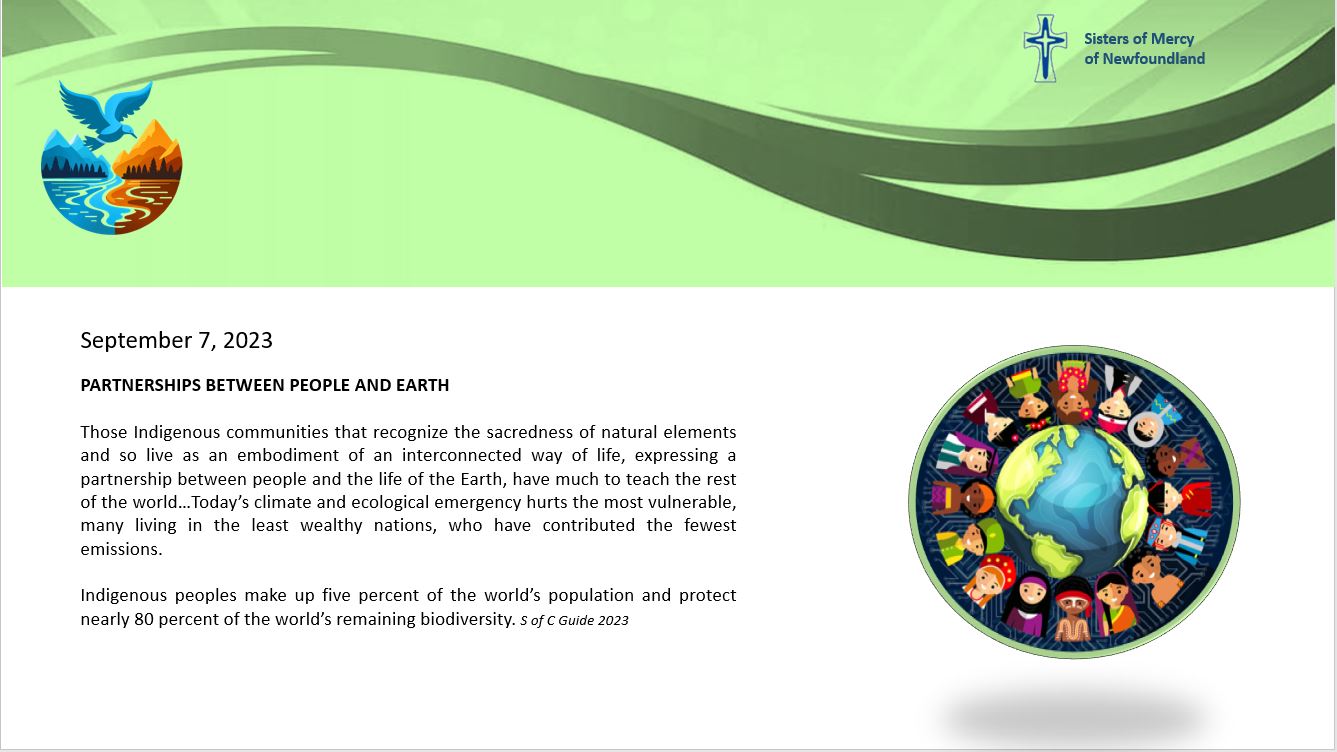
_________________________________________________________________________________________________________________________
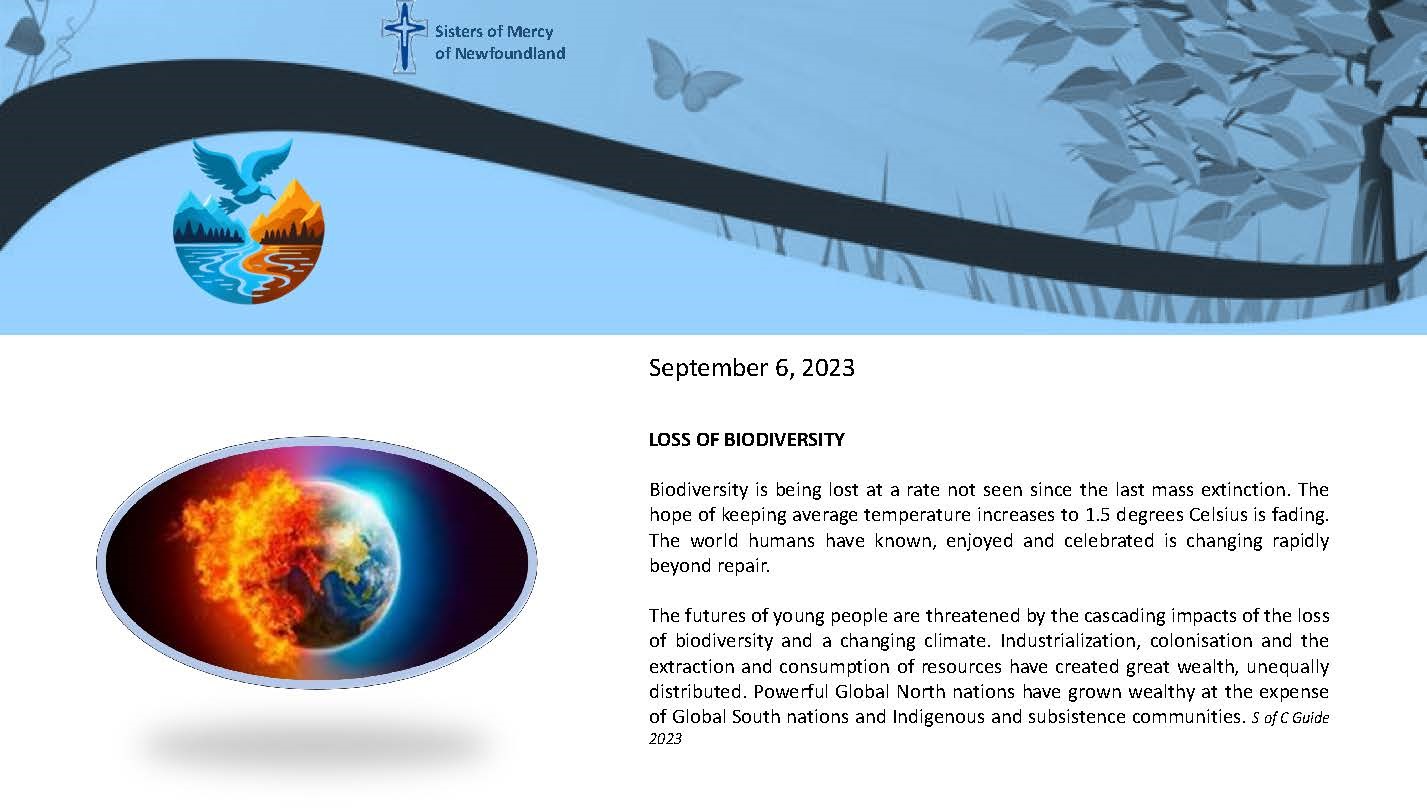
_________________________________________________________________________________________________________________________
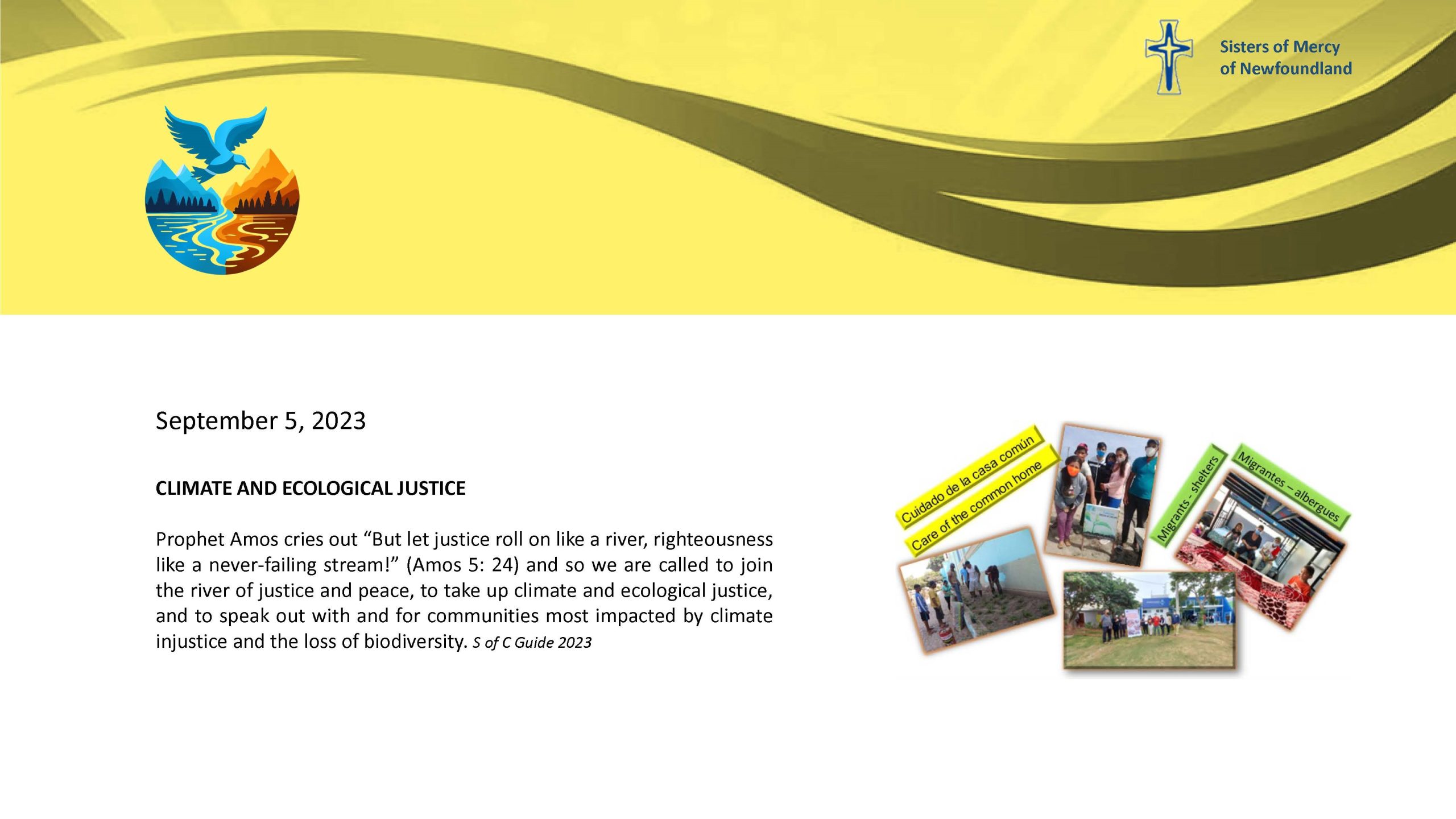 _____________________________________________________________________________________________________________________________
_____________________________________________________________________________________________________________________________

________________________________________________________________________________________________________________________
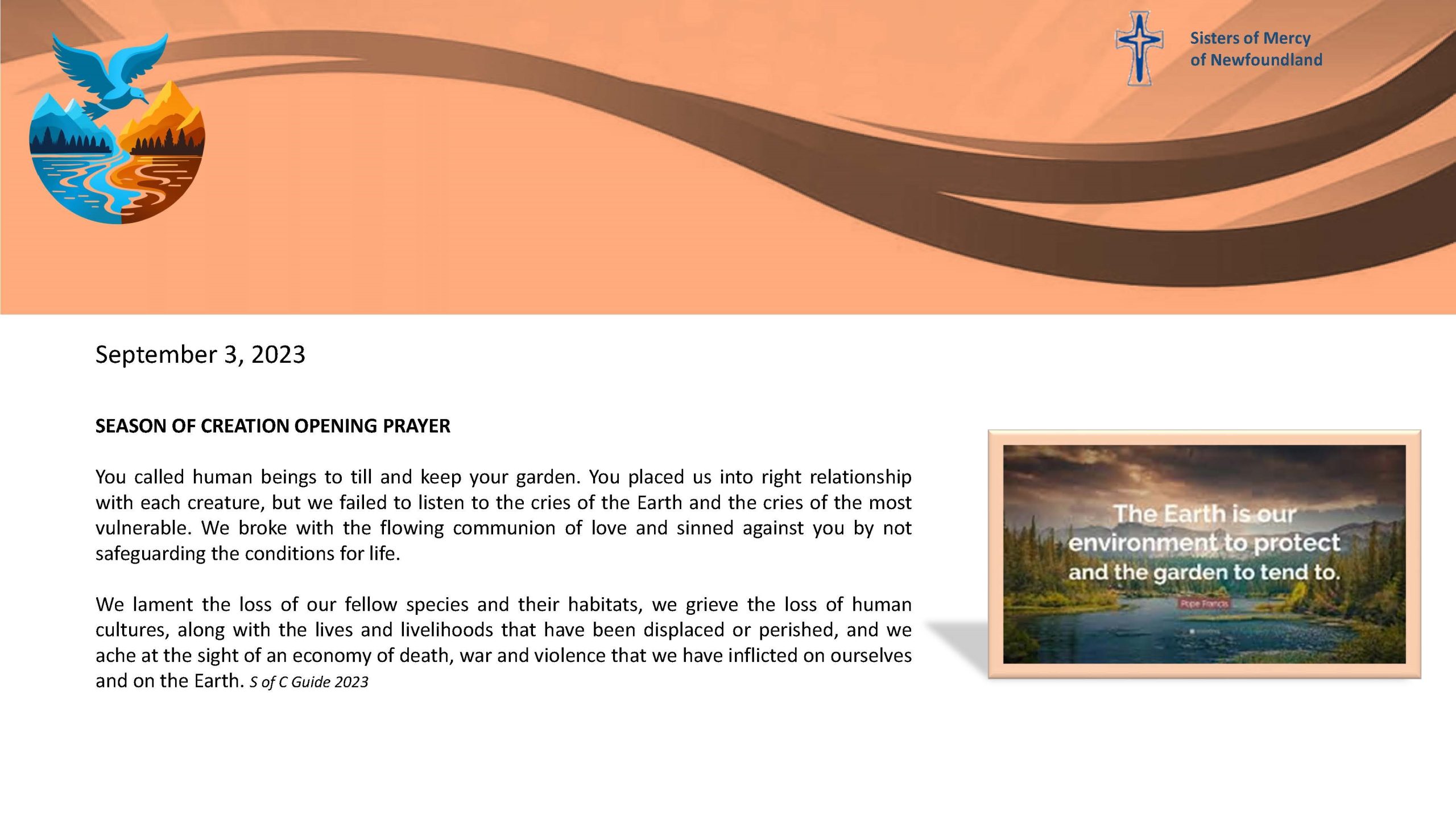
_______________________________________________________________________________________________________________________________
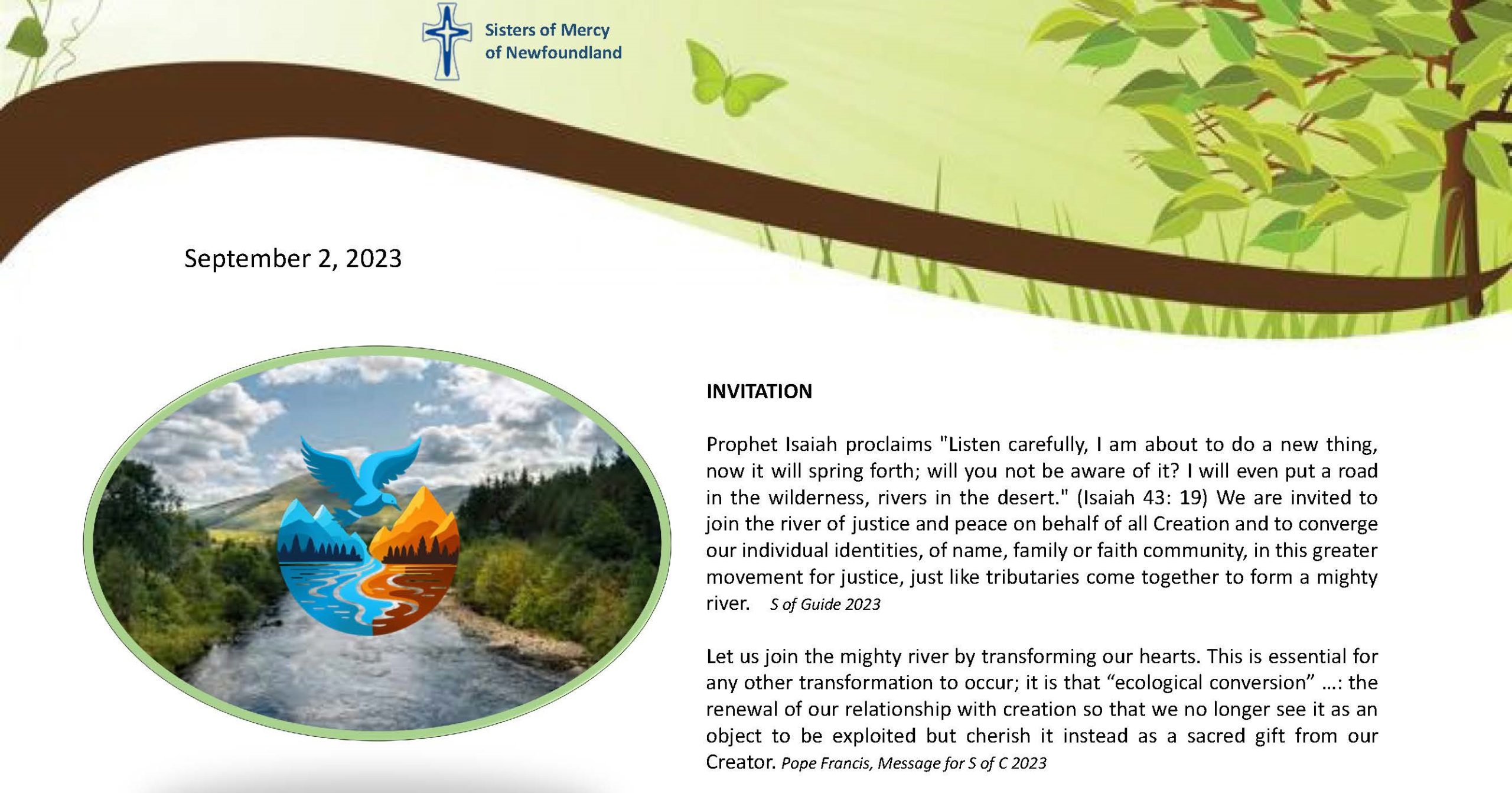
Each year from September 1, the World Day of Prayer for Creation to October 4, the feast of St. Francis of Assisi, Christians all over the world are called to unite in prayer and action for our common home.
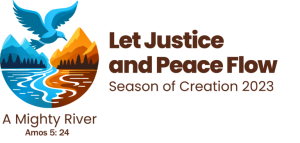 The theme of this year’s Season of Creation is Let Justice and Peace Flow, based on Amos 5:24, where Amos uses the image of a mighty river to symbolize Justice. In his 2023 Creation Day message, Pope Francis asks that we “join the mighty river by transforming our hearts.” He goes on to say that this requires an ecological conversion and an integral approach to respect for the environment that involves relationship with God, with our sisters and brothers of today and into the future, with all of nature and with ourselves. He speaks of the synodal process in which our church is engaged as an invitation to all on this transformative journey to “coalesce in a majestic river of reflection and renewal” like the tributaries in nature which flow into and are absorbed into the mighty river.
The theme of this year’s Season of Creation is Let Justice and Peace Flow, based on Amos 5:24, where Amos uses the image of a mighty river to symbolize Justice. In his 2023 Creation Day message, Pope Francis asks that we “join the mighty river by transforming our hearts.” He goes on to say that this requires an ecological conversion and an integral approach to respect for the environment that involves relationship with God, with our sisters and brothers of today and into the future, with all of nature and with ourselves. He speaks of the synodal process in which our church is engaged as an invitation to all on this transformative journey to “coalesce in a majestic river of reflection and renewal” like the tributaries in nature which flow into and are absorbed into the mighty river.
On 4 October Pope Francis will release a follow-up document to his 2015 encyclical Laudato Si’ in an effort to help “put an end to the senseless war against our common home”.
October 4 also marks the opening of the first session of the Synod, the meeting of the universal Catholic Church, in Rome. Read more here.
Cada año, desde el 1 de Septiembre, Jornada Mundial de Oración por la Creación, hasta el 4 de Octubre, fiesta de San Francisco de Asís, los Cristianos de todo el mundo son llamados a unirse en oración y acción por nuestra casa común.
El tema del Tiempo de la Creación de este año es Que fluyan la justicia y la paz, basado en Amós 5:24, donde Amós utiliza la imagen de un río caudaloso para simbolizar la justicia. En su mensaje del Día de la Creación 2023, el Papa Francisco pide que “nos unamos al caudaloso río transformando nuestros corazones”. Continúa diciendo
que esto requiere una conversión ecológica y un enfoque integral del respeto del medio ambiente que implique una relación con Dios, con nuestros hermanos y hermanas de hoy y del futuro, con toda la naturaleza y con nosotros mismos. Habla del proceso sinodal en el que está comprometida nuestra Iglesia como una invitación a todos en este viaje transformador a “confluir en un majestuoso río de reflexión y renovación” como los afluentes de la naturaleza que desembocan y son absorbidos por el caudaloso río.
El 4 de octubre, el papa Francisco publicará un documento de seguimiento de su encíclica de 2015 Laudato Si’ en un esfuerzo por ayudar a “poner fin a la guerra sin sentido contra nuestra casa común”.
El 4 de octubre también marca la apertura de la primera sesión del Sínodo, la reunión de la Iglesia católica universal, en Roma. Más información aquí.
 Each Sunday in Advent, Sr. Elizabeth Davis and her fellow Mercy sisters light a candle on their cosmic Advent wreath adorned with shells, pinecones, rocks and colorful ribbons.
Each Sunday in Advent, Sr. Elizabeth Davis and her fellow Mercy sisters light a candle on their cosmic Advent wreath adorned with shells, pinecones, rocks and colorful ribbons.
The four candles symbolize the births of, in order: the universe, the solar system, Jesus Christ and, finally, “the birth of each one of us into the whole cosmic body of the universe,” said Davis, a member of Mercy International Association.
While Christmas is a celebration of God becoming incarnate through the birth of Jesus Christ, theologians consider God’s first act of incarnation to be the birth of the cosmos, inspiring some religious communities to incorporate a cosmic dimension to their seasonal reflections and celebrations. (Davis noted that her community, Sisters of Mercy of Newfoundland, got the idea of a cosmic Advent wreath from the School Sisters of Notre Dame.)
The Mercy sisters are working to democratize the theological language around Christ and the cosmos through Mercy Global Presence, a program that uses art and ordinary language to examine otherwise abstract topics. The online resource for December is themed “Incarnate God in Cosmos and in Person of Jesus.”
“What’s happening now is quite a fundamental shift for ordinary sisters, men, women and children, that we’re starting to understand [the universe] in ways we couldn’t have even 10 years ago,” said Davis, who serves on the guiding team for Mercy Global Presence and as liaison with the 12 congregational leaders of Sisters of Mercy.
“That’s a fundamental shift in our theology, in our spirituality, in how and where we do ministry,” she said.
And a shift in how to think about Christmas…
Read the rest of the article in Global Sisters Report here
Pope Francis is writing a second part to his 2015 environmental encyclical Laudato Si’, he announced during an audience with European lawyers on Monday, 21 August. Speaking off-the-cuff to a delegation of lawyers from member countries of the Council of Europe on Monday, Pope Francis said he was writing a second part of his Laudato si’ encyclical to update it to “current issues”.
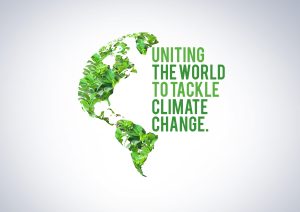 The Pope was expressing his appreciation for the attorneys’ commitment to developing a legal framework aimed at protecting the environment.
The Pope was expressing his appreciation for the attorneys’ commitment to developing a legal framework aimed at protecting the environment.
“We must never forget that the younger generations have the right to receive a beautiful and livable world from us, and that this implies that we have a grave responsibility towards creation which we have received from the generous hands of God,” said the Pope. “Thank you for your contribution.”
In a statement later on Monday, the Director of the Holy See Press Office, Matteo Bruni, explained that the new updated version of Laudato si’ will focus in particular on the most recent extreme weather events and catastrophes affecting people across five continents.
Read the rest of the Vatican News article here
El Papa Francisco está escribiendo una segunda parte de su encíclica medioambiental Laudato Si’ de 2015, según anunció durante una audiencia con juristas europeos el lunes 21 de agosto. Ante una delegación de juristas de los países miembros del Consejo de Europa, el Papa Francisco anunció que estaba escribiendo una segunda parte de su encíclica Laudato si’ para actualizarla a los “problemas actuales”.
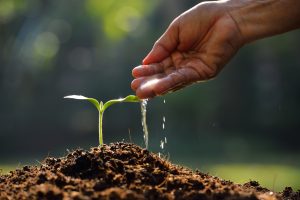 El Papa estaba expresando su aprecio por el compromiso de los abogados para desarrollar un marco jurídico destinado a proteger el medio ambiente.
El Papa estaba expresando su aprecio por el compromiso de los abogados para desarrollar un marco jurídico destinado a proteger el medio ambiente.
“No debemos olvidar nunca que las jóvenes generaciones tienen derecho a recibir de nosotros un mundo bello y habitable, y que esto implica que tenemos una grave responsabilidad hacia la creación que hemos recibido de las manos generosas de Dios“, dijo el Papa. “Gracias por vuestra contribución”.
En un comunicado posterior al lunes, el director de la Oficina de Prensa de la Santa Sede, Matteo Bruni, explicó que la nueva versión actualizada de Laudato si’ se centrará en particular en los últimos fenómenos meteorológicos extremos y en las catástrofes que han afectado a la población de los cinco continentes.
Lea aquí el resto del artículo de Vatican News